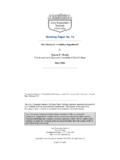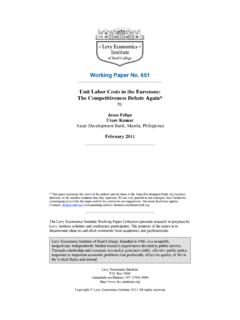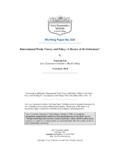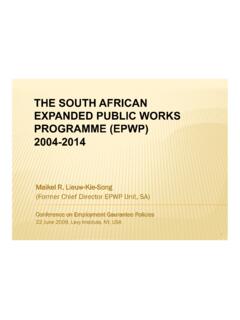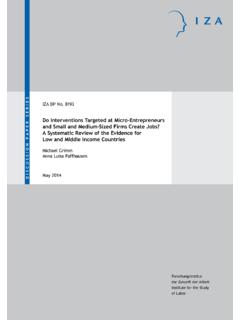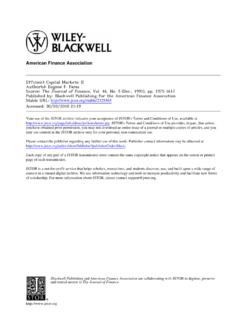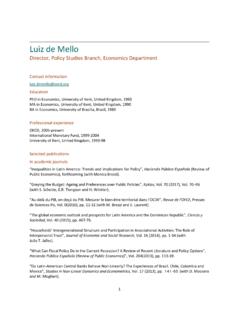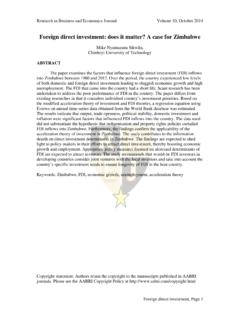Transcription of Financialization: What it is, Why it Matters, & What …
1 Working Paper No. 525 financialization : What It Is and Why It Matters*by Thomas I. PalleyThe Levy Economics InstituteandEconomics for Democratic and Open SocietiesWashington, 2007 Paper presented at a conference on Finance-led Capitalism? Macroeconomic Effects of Changesin the Financial Sector, sponsored by the Hans Boeckler Foundation and held in Berlin,Germany, October 26 27, 2007. My thanks to conference participants for their valuablesuggestions. All errors in the paper are my own. Comments may be sent Levy Economics Institute Working Paper Collection presents research in progress byLevy Institute scholars and conference participants. The purpose of the series is todisseminate ideas to and elicit comments from academics and Levy Economics Institute of Bard College, founded in 1986, is a nonprofit,nonpartisan, independently funded research organization devoted to public scholarship and economic research it generates viable, effective public policyresponses to important economic problems that profoundly affect the quality of life inthe United States and Levy Economics Box 5000 Annandale-on-Hudson, NY 12504-5000 The Levy Economics Institute 2007 All rights financialization is a process whereby financial markets, financial institutions, and financial elites gain greater influence over economic policy and economic outcomes.
2 financialization transforms the functioning of economic systems at both the macro and micro levels. Its principal impacts are to (1) elevate the significance of the financial sector relative to the real sector, (2) transfer income from the real sector to the financial sector, and (3) increase income inequality and contribute to wage stagnation. Additionally, there are reasons to believe that financialization may put the economy at risk of debt deflation and prolonged recession. financialization operates through three different conduits: changes in the structure and operation of financial markets, changes in the behavior of nonfinancial corporations, and changes in economic policy. Countering financialization calls for a multifaceted agenda that (1) restores policy control over financial markets, (2) challenges the neoliberal economic policy paradigm encouraged by financialization , (3) makes corporations responsive to interests of stakeholders other than just financial markets, and (4) reforms the political process so as to diminish the influence of corporations and wealthy elites.
3 Keywords: financialization ; Neoliberal Policy; Deregulation; Debt; Financial Fragility JEL Classifications: B50, E44, E60 2I. financialization : WHAT IT IS AND WHY IT IS OF CONCERN This paper explores the construct of financialization , which Epstein (2001) defines as follows: financialization refers to the increasing importance of financial markets, financial motives, financial institutions, and financial elites in the operation of the economy and its governing institutions, both at the national and international level (Epstein 2001, ). The paper focuses on the economy, which is where financialization seems to be most developed. However, judging by the increase in rentier income shares, financialization appears to have infected all industrialized economies (Power, Epstein & Abrena 2003; Jayadev and Epstein 2007). financialization transforms the functioning of the economic system at both the macro and micro levels. Its principal impacts are to (1) elevate the significance of the financial sector relative to the real sector, (2) transfer income from the real sector to the financial sector, and (3) contribute to increased income inequality and wage stagnation.
4 financialization raises public policy concerns at both the macroeconomic and microeconomic levels. At the macro level, the era of financialization has been associated with tepid real economic growth, and growth also appears to show a slowing There are also indications of increased financial fragility. Internationally, fragility was evident in the run of financial crises that afflicted the global economy in the late 1990s and early 2000s, and it has surfaced again in the recent sub-prime mortgage crisis that spread to Europe. Furthermore, there are serious reservations about the sustainability of the financialization process. The last two decades have been marked by rapidly rising household debt-income ratios and corporate debt-equity ratios. These developments explain both the system s growth and increasing fragility, but they also indicate unsustainability because debt constraints must eventually bite. The risk is when this happens the economy could be vulnerable to debt-deflation and prolonged recession.
5 These macroeconomic concerns are compounded by concerns about income distribution. Thus, the era of financialization has witnessed a disconnection of wages 3from productivity growth, raising serious concerns regarding wage stagnation and widening income and wealth inequality (Mishel et al. 2007). The financialization thesis is that these changes in macroeconomic patterns and income distribution are significantly attributable to financial sector developments. Those developments have relaxed constraints on access to finance and increased the influence of the financial sector over the non-financial sector. For households this has enabled greatly increased borrowing. For non-financial firms, it has contributed to changes in firm behavior. When combined with changes in economic policy that have been supported by financial and non-financial business elites, these developments have changed the broader character and performance of the economy.
6 II. financialization AND CONVENTIONAL ECONOMIC THEORY Conventional economic theory has played an important role promoting financialization . One area where theory has been especially important is the formulation of the relationship between firms and financial markets in terms of an agency problem (Jensen and Meckling 1976) whereby the challenge is to get the firm s managers to maximize profits on behalf of shareholders. This representation has had important consequences. First, the agency approach envisages the solution to the corporate governance problem as one of aligning the interests of managers with those of financial market participants. That has been used to rationalize the explosion in top management compensation and stock option grants, and it has also been used to justify the rise of the takeover movement and private equity investment. Second, the agency approach promotes a legal view whereby the sole purpose of corporations which are a societal construction is to maximize shareholder returns within the confines of the law.
7 That has served to restrict the focus of policy discussion to how to give shareholders greater control over managers. Meanwhile, broader questions regarding the purpose of corporations and the interest of other stakeholders have been kept completely off the policy table. Conventional economic theory has also lent support for financialization , by arguing that the expansion of financial markets enhances economic efficiency. This 1 Stockhammer (2007) has documented that growth in the EU has also been tepid over the past twenty-five years during the era of financialization . 4rationale draws from Arrow and Debreu s (1954) construction of financial assets as contingent claims. According to this view, expanding the scope of financial markets and the range of financial assets increases efficiency by expanding the states of nature spanned by financial instruments.
8 This enables markets to better price future economic outcomes, improves the ex-ante allocation of resources across future contingent economic conditions, and helps agents assemble portfolios that provide better returns and risk Conventional theory has also tended to dismiss problems of financial speculation using Friedman s (1953) argument that speculation is stabilizing. According to Friedman, market prices are set on the basis of economic fundamentals. When prices diverge from those fundamentals that creates a profitable opportunity. Speculators then step in and buy or sell, driving prices back to the level warranted by fundamentals. Increasing the number of traders and volume of trading is also regarded as improving financial market outcomes. Increased trade volume increases market liquidity so that market prices are less susceptible to small random disturbances or manipulation by individual market participants. Last, macroeconomic theory has also supported this optimistic view of financial markets through q-theory (Brainard and Tobin 1977).
9 Q represents the ratio of the market price of capital to its replacement cost, and the q-ratio supposedly provides firms with a signal that efficiently directs investment and capital accumulation. Thus, when q is greater than unity, the market price exceeds the replacement cost. That sends a signal that capital is in short supply and profitable investment opportunities are available, and firms respond by investing. As always, there is some mainstream literature challenging these conclusions, and that literature is growing with the emergence of the behavioral finance approach. For instance, rational expectations theory (Flood and Garber1980) acknowledges that market participants can rationally participate in bubbles if they have expectations of rising prices. The noise trader literature initiated by De Long et al. (1990) argues that risk-neutral 2 One caveat to this argument is from second-best theory.
10 If markets are incomplete, expanding the number of markets can theoretically worsen outcomes by increasing the returns to distorted trades, thereby amplifying their volume. However, this is a theoretical possibility and there is no a priori reason to believe that this will actually happen. 5speculators who trade purely on noise can generate market inefficiency if other traders are risk averse. Hirshleifer (1971) argues that financial market activity can be socially wasteful if the activity is the result of divergent subjectively held beliefs, making it more akin to betting at a racecourse than productive investment. In this case the race uses valuable economic resources but produces nothing. Lastly, Crotty (1990) and Palley (2001) have criticized the logic of q-theory, arguing it erroneously conflates the behaviors and expectations of managers with those of shareholders and the reality is stock market signals to invest can be highly inefficient.

